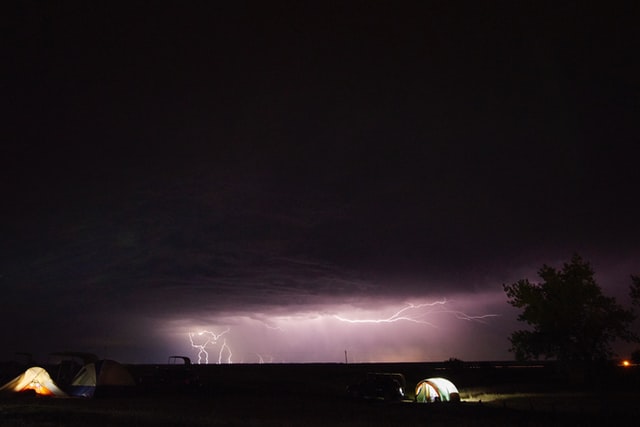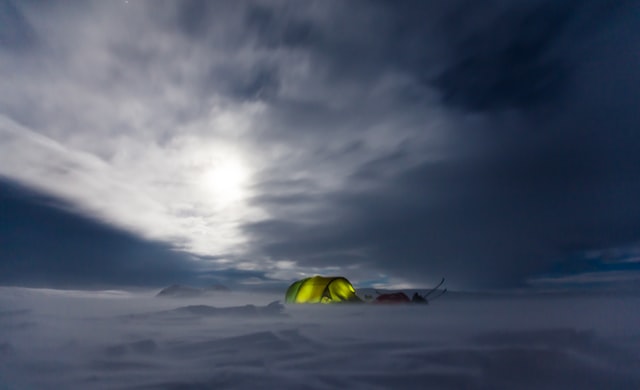
You are stuck in a storm, while camping can be extremely dangerous. If you don’t have the right gear or plan, staying in your hotel room or home is best. However, suppose you are determined to stay outside despite the weather conditions and only have a tent for shelter. In that case, there are some things that you can do to keep yourself safe from lightning strikes and other dangerous elements of nature during such an event.
Planning and staying updated before heading out into the wild is essential.
Generally, when you plan to go camping in the wilderness, you must have the right gear in your possession. That also applies to staying safe and warm during a storm. The first step is ensuring that you have all of the things on this list:
- A tent (or another shelter)
- A sleeping bag or blankets
- A first aid kit with supplies like antiseptic wipes and bandages
- Flashlight and spare batteries
- Radio or cellphone
If you think you’ll be exposed to severe weather, look for a motel or car to stay in instead.
Generally, if you think you’ll be exposed to severe weather while camping, look for a motel or car to stay in instead. You can’t get out of the way of a tornado or hurricane when you’re in a tent. You also won’t be able to get away from floodwaters that may rise and engulf your campsite (and everything else). A wildfire will stop at nothing—not even solid metal—to burn down everything in its path. Even if it doesn’t reach your tent, smoke and ash might fill it so entirely that breathing becomes impossible.
Choose wisely if your only options are sleeping outside or inside a burning building!
But if you intend to stay in your tent anyway, ensure you have the right gear.
If you plan to stay in your tent for a storm, ensure you have the right gear.
- Make sure it’s waterproof. That should be obvious. If your tent doesn’t keep out the water, your whole camp may end up in a lake when the storm hits.
- Make sure it’s windproof. That is less important than waterproofing because if it’s not strong enough to withstand high winds, at least you can batten down the hatches and hunker down inside until things calm down again. But if water gets through anyway (or worse yet, if snow or ice comes down), then…well… we’ll get into that later on!
- Make sure it has sturdy stakes and guy lines to secure them firmly against wind gusts. At the same time, they’ve set up outside before taking shelter inside during storms with strong winds, which risk blowing away anything left unattended around campsites, including tents.
It would help if you also prepared your tent beforehand by waterproofing and taping it.
It would help if you also prepared your tent beforehand by waterproofing and taping it. There are plenty of products on the market for this purpose, like UV protection sprays (which can help increase the lifespan of your tent) or sealant tape to cover seams. You can also use a waterproof fabric for your tent walls and floor or invest in a tarp that covers the entire thing when you’re not using it. If you have access to such things, ground cloths are another great way to protect your sleeping area from moisture—they help keep mud from getting on top of you while sleeping!
In case a storm does approach your area, do some research on where to go.
Suppose a storm approaches your area, research where to go. Look for a place that’s away from trees, rocks and water. Find a slot with walls and a roof to protect you from the elements. A fire pit is also essential for staying warm. We recommend bringing along a first aid kit in case of any accidents or injuries during your adventure.
If there are no nearby shelters, find an elevated spot away from water, trees, and loose rocks.
If there are no nearby shelters, find an elevated spot away from water, trees, and loose rocks. That will help protect you against the elements. Please stay away from low areas as they often flood first. Do not set up your tent near trees or other vegetation types since they can fall during high winds and cause damage to your shelter.
If possible, try to position yourself on high ground where you can avoid being hit by wind-driven rain or hail stones falling from the sky. When lightning strikes nearby, it could start you out of bed, so it’s best to stay in a sleeping bag instead of under blankets when inside your tent (if this isn’t possible).
You can stay safe during a storm when camping with the proper preparations.
- Know your tent and its limitations. If camping in a tent, remember that it may not withstand gale force winds. You can check your tent’s manufacturer recommendations to see if they recommend using it in windy conditions. – Best Tents For Camping
- Know your location and the weather. If you are hiking or camping somewhere new, use this time to get familiar with the area. What types of weather might affect it—this way, if something happens unexpectedly, you’ll have an idea of what’s happening around you before deciding whether or not to stay put or leave your current location as soon as possible (Weather Forecast for Camping).
- Be prepared to stay in your tent no matter what happens during a storm! That means having plenty of snacks on hand for hunger strikes after hours without food, ensuring enough water for everyone, preparing everything else needed before getting settled into bed at night; etc., etc., etc. It also means being willing to change locations if necessary (more on later).
- Read More: How do I make a camping tent safe from lightning strikes?
Last Words
The most important thing is to stay safe and not be afraid to abandon your tent if necessary. It’s better to stay in a shelter than get hurt by the elements!
Read More: What to do when camping in bad weather? – HERE
